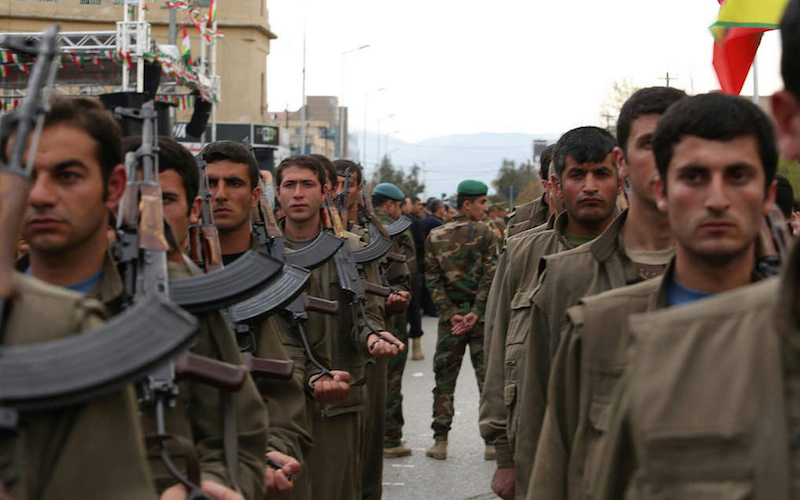
Can War in Southeastern Turkey be Avoided?
Tensions in southeastern Turkey are approaching a turning point, potentially an open civil war. In July 2015, the Islamic State in Iraq and the Levant (ISIL) bombed Suruç during a press conference regarding the reconstruction of Kobani. A week later, Turkey joined the fight against ISIL through Operation Martyr Yalçın, which was accompanied by also bombing Turkish and Iraqi Kurds. This suggests that the ceasefire, established in March 2013 with the Partiya Karkerên Kurdistanê (PKK), or ‘Kurdistan Worker’s Party,’ is probably now de facto over. In light of this, the last three months have seen reignited clashes between the sides, which has not occurred since the mid-1990’s. The PKK has been continuously mobilizing and readying for a sustained conflict. In early September, the PKK fatally ambushed 15 Turkish soldiers in Hakkari, and from then on, increasingly frequent clashes have erupted in Southeastern Turkey. As a result, Turkish troops have made an incursion into northern Iraq and several other crackdowns in retaliation.
Since June, in various parts of Turkey, people have increasingly taken to the streets to protest the government’s failure to protect or to stop anti-Kurdish hostilities. These all too often clashes with the police, result in the police resorting to teargas or water cannons. In Ankara, mass anti-violence demonstrations have been either ignored or met with suicide bombers, the most recent of which killed nearly 130 and injured more than 250. Although, it is not yet confirmed that ISIL was responsible, given the previous bombings, it is likely. Finally, the Turkish military has now intensified airstrikes and its incursion into Northern Iraq and South Eastern Turkey against the PKK, rather than against ISIL or ISIL affiliated groups, who are the primary suspects. Since July 2015, Turkey has arrested over 1,300 PKK suspects, but no more than 300 ISIL suspects.
Therefore, the Turkish government may be prioritizing the suppression of Kurdish expression over combating ISIL while ISIL remains an enemy to any UN member-state. Kurdish movements, however, aim to legitimize their cause. Speculation regarding the Turkish government turning a blind eye towards ISIL activity within its borders has resurfaced.
These increases in Turkish military and Kurdish confrontations, together with ISIL’s terror campaigns also targeting the Kurds, without facing sincere retaliation from the Turkish military are intensifying the situation. If southeastern Turkey continues along this given trajectory, an all-out war is possible within the next few weeks.
The intensified violence with the PKK has geopolitical implications and the Kurdish people locally are affected by the political rhetoric of the region. Therefore, this is an opportunity for the international community, namely the UN Security Council, to step in and prevent the massacre from continuing.
Build up
For decades, arguably for centuries, the Kurds have been fighting for independence, degrees of autonomy, or just outright survival, across northern Syria, Iraq, Iran, and finally, in the Southeastern corner of Turkey. Kurdish prominence in the region is multifariously divided, with at least a dozen different parties or armed groups in each of these countries.
1977 PKK was founded in Turkey and has been under almost constant attack by the Turkish military. In response, the PKK has employed armed groups. The conflicts still exist today.
1980 The Turkish military cracks down on many political organizations including the PKK.
1982 The PKK joins the Lebanese Civil War on the Syrian side, and campaigns for an independent Kurdish state in the northern Syrian-Iraqi-Irani and Southeastern Turkish area.
1984 The PKK launches an insurgency in Southeastern Turkey.
1990’s Countless villages were destroyed in the Kurdish areas of Southeastern Turkey.
1999 Öcalan is detained by the CIA and a ceasefire is invoked in order to deescalate tensions. The PKK withdrew its demands for an independent state of Turkish Kurdistan, and instead appealed for increased autonomy for the Kurds.
2004 The PKK claim that despite the ceasefire, the Turkish government has ignored calls for negotiations and had not halted military operations against them. The PKK resumes military operations, the ceasefire is broken and the second insurgency begins.
2005 PKK found the Koma Civakên Kurdistan (KCK), or the Group of Communities in Kurdistan, which arbitrarily unites Kurdish political movements across Iraq, Iran, Syria, and Turkey.
2007 Iranian Kurdish insurgents postpone operations within Iran in order to fight the Turkish military.
2012 The PKK intensify their attacks against the Turkish military.
2013 A ceasefire is invoked as part of negotiations between Öcalan and Erdoğan.
2014 Hezbollah supporters clash with PKK fighters during a re-emergence of protests throughout Turkey, due to the government’s lack of initiative to retake Kobani from ISIL.
Geopolitical Implications
The U.S. has selectively supported and funded Kurds in the past. Currently, the U.S. is vaguely supporting the YPG, who are the official defense force of the autonomous Syrian Kurdish governorate. The YPG operates in northern Syria and within Turkey around the Turkish-Syrian border. The increasingly famous Women’s Protection Units, or Yekîneyên Parastina Jin (YPJ), also operate in these areas, generally side by side with other Kurdish fighters, but do not uphold U.S. sponsorship.
The PKK, however, are Turkish Kurds who are branded as a terrorist group by the U.S. and the E.U. because Turkey belongs to NATO. However, the U.N. does not identify the PKK as a terrorist group. Erdogan’s ruling party, Adalet ve Kalkınma Partisi (AKP), is a conservative party whose rhetoric reflects anti-Kurdish independence, regardless of affiliation. Traditionally there has not been a conflict of interest between the U.S. backing the YPG, and the Turkish government’s anti-Kurdish stance.
In June 2015, with the help of U.S. airstrikes, the YPG took Tel Abyad from ISIL, and attempted to incorporate it into an emerging autonomous Kurdish ‘canton.’ Consequently, after an increase in tensions in late October 2015, the Turkish military confirmed hits on the YPG, which, in Turkey’s view, is the Syrian offshoot of the PKK. This demonstrates Turkish willingness to engage with Kurdish groups which it sees as a threat, even if they are supported by NATO and pinpoints a turning point in the Kurdish struggle. The YPG and PKK fight side by side in various operations and are not always easily distinguishable. However, they do not act as a unitary force. If the U.S. continues to support the YPG, the efforts may indirectly aid the PKK, which will be countered by the Turkish government. The U.S. will lose access to an anti-ISIL fighting force on the ground actually capable of taking back cities and territories.
If, however, the U.S. continues to support the YPG, it would have to manipulate it into being an anti-ISIL force and not a pro-Kurdish force in order to not provoke the Turkish government. As seen with the recent U.S. withdrawal of ‘moderate’ Syrian rebel support, controlling rebels in open armed conflicts has not thus far been successful. Where the Kurds thus far have been banking on fighting ISIL as part of legitimizing their autonomy, the Kurds may now also delay the anti-ISIL campaign in order to fight the groups and governments who suppress them.
The proximity of Russian intervention on the Turkish border may change the dynamic of the conflict in Southeastern Turkey. The PKK’s campaign has been against the Turkish government. Its rhetoric supports Kurdish autonomy and criticizes the Turkish government’s lack of action against ISIL. Now that ISIL is in retreat, the YPG and PKK have gained more territorial control in northern Syria and are threatening areas on the Turkish border. Since the Turkish government has shown no hesitation in cracking down on pro-Kurdish movements and is negligent in preventing anti-Kurdish attacks by ISIL, chances are that the violence in the area is likely to intensify. If ISIL’s role diminishes, the confrontations will become more direct. There will be less reason for the U.S. to support the Kurds, basically giving the Turkish government a free pass to crack down on pro-Kurdish movements. That is, unless the UN or NATO step in.
The Way Forward
Objectively, what is the moral stand in this conundrum? Can the YPG and PKK be trusted to respect non-Kurds within the territories where they wield influence? Do the local Kurds genuinely want autonomy as well or is it more of a pretext for political ambition? From the perspective of a casual spectator from the international community, we probably cannot make a well informed judgement.
In early November 2015, Öcalan was awarded the International Peace Prize. Italy’s International Peace Bureau (IPB) felt that Öcalan’s notions on autonomy and democracy provide a framework for peaceful co-existence. The longer the UN waits before taking action, the tenser these options for co-existence become. We look to the UN as the international peacekeeping force, but it is difficult to imagine Turkey agreeing to a pro-Kurdish mandate, especially now that the AKP has retained power through the recent elections. Turkey’s South East has immediately taken to the streets in a cry for help, knowing AKP has now the means to continue berating Kurdish motives. NATO, on the other hand, probably has more influence as it is worried that Russian air strikes are such an effective fighting force against ISIL.
In the end, it is the citizens who lose due to political and military squabbling, and they are very well aware of this. A delegation of 4 pro-Kurd parties met leaders of the PKK on September 15 to discuss the increase in violence. Presumably the violent response of the PKK could potentially undermine any peaceful progress of Kurdish autonomy in other regions simply by association. On 18 September, thousands marched in Ankara for national unity once again in protest of the violence between the Turkish forces and PKK. This was definitely an opportunity for the Turkish government to embrace the multiculturalism that Turkey prides itself on. Because the people are actively performing their civil duty by engaging in protests – despite being met with suicide bombers and police oppression – the anti-violence movements have substantial validity, and it is the duty of the decision making bodies of the UN and NATO to ensure that these voices are being heard.

